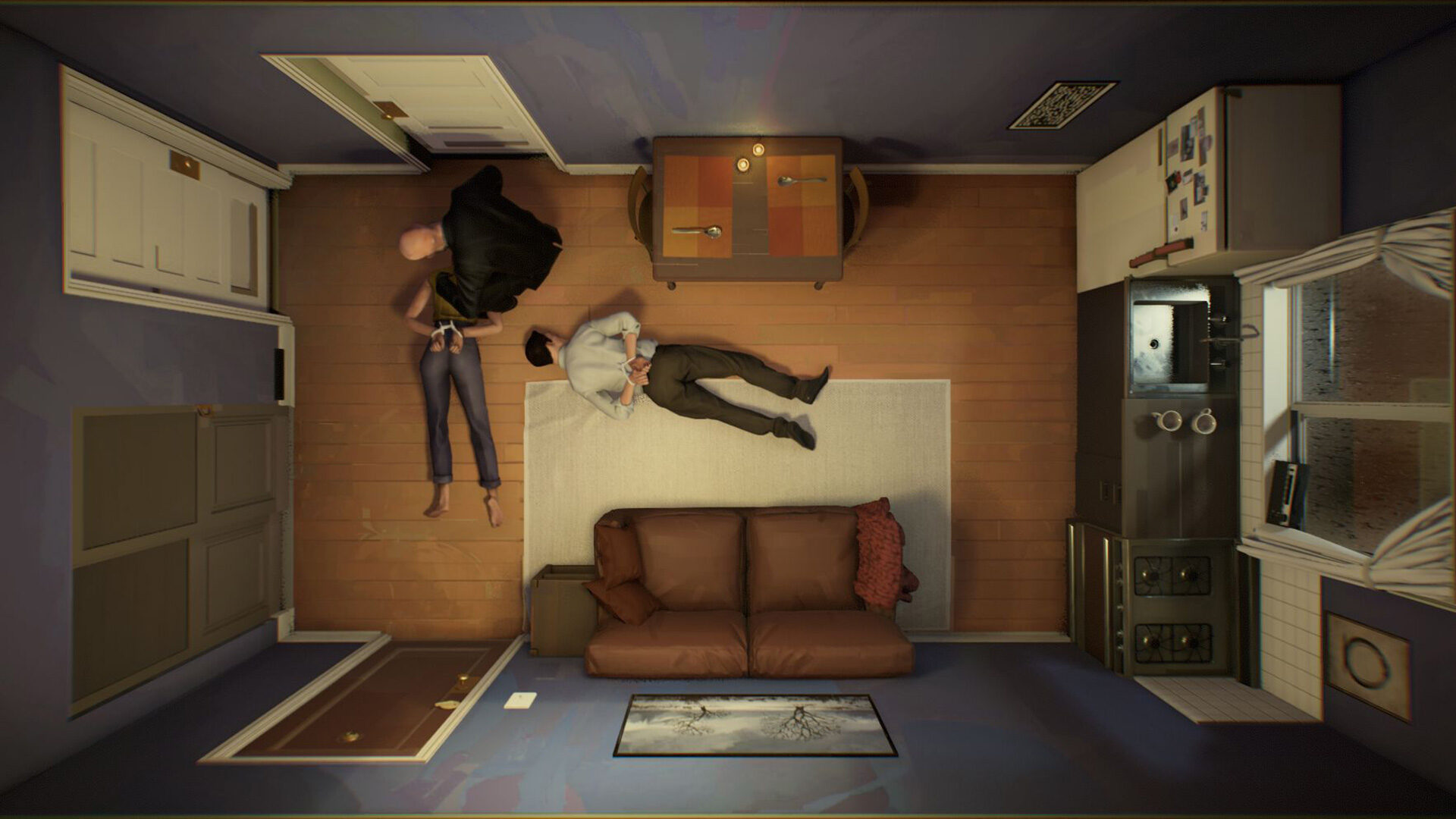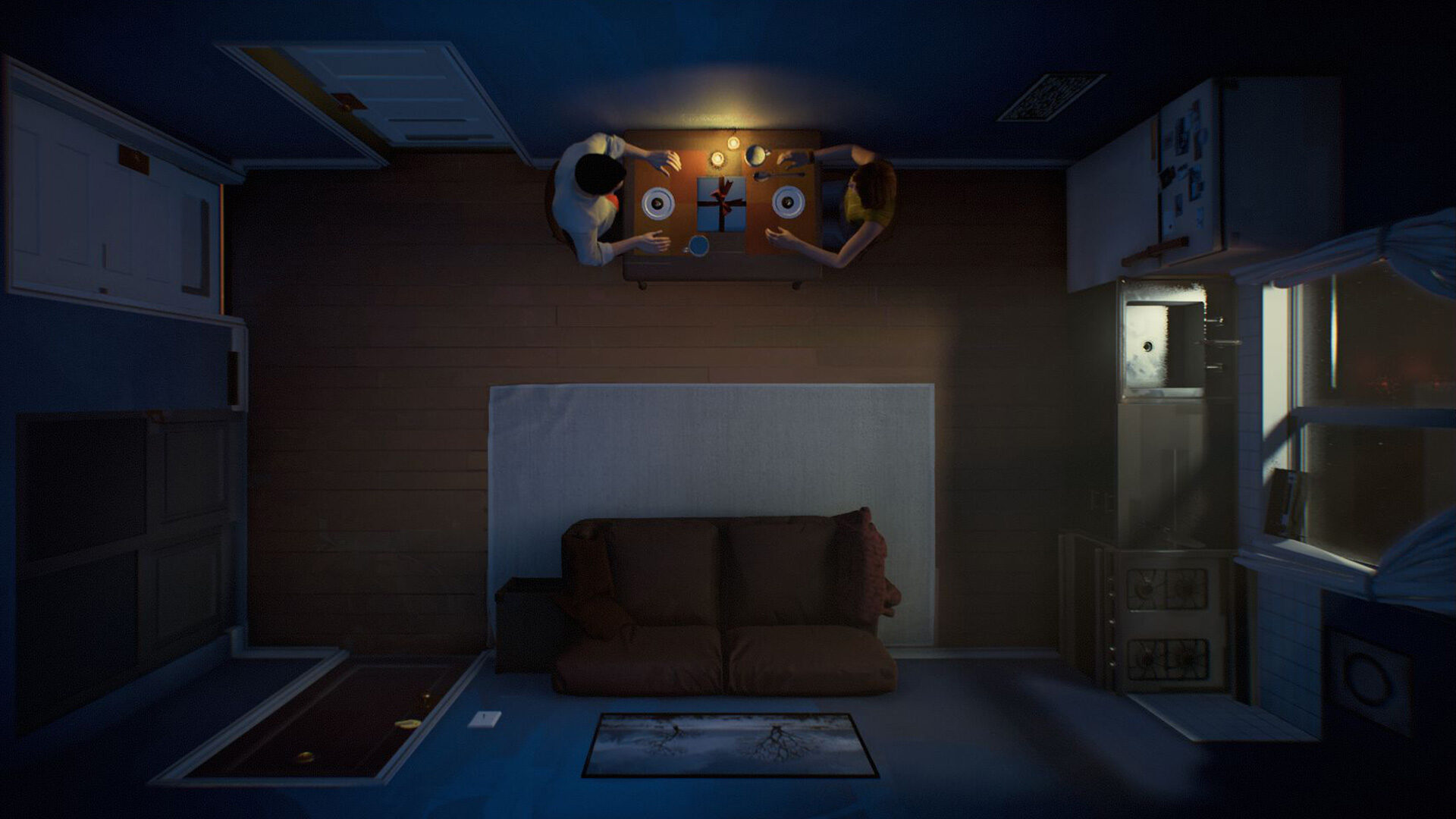Though development on Twelve Minutes started before the pandemic, it’s a game that feels entirely of its time. Essentially, it’s about a man reliving the worst night of his life over and over and over again, trapped within the confines of a small, three-room apartment. Not only is time repeating, but so is the space in which he’s experiencing that time. It’s a nightmare scenario that a lot of us can relate to, although maybe not enough of us, given our current infection rate.
Twelve Minutes brings that nightmare to life in the context of an interactive thriller in which you have to figure out why a man claiming to be a police officer breaks into your house to kill you and your wife—a situation that repeats itself every 12 minutes. But, unlike the stay-at-home reality of the last year and a half, the time loop in Twelve Minutes offers the antithesis of imprisonment in the freedom it gives you to interact with the small details of your environment and change how each loop plays out.
There’s a reason why Groundhog Day is such a memorable and influential movie, and it isn’t just Bill Murray’s performance or the treacly “the secret to life is love after all” message. Really, it’s the middle of the movie, when Phil Connors realizes that the hell of repeating the same day over and over again also means the freedom to do whatever you want without consequences. This is the basic philosophy to navigating Twelve Minutes’ puzzles, and they sometimes require you to step outside your comfort zone and perform actions that might at first seem counterintuitive and downright cruel.
Twelve Minutes’ gameplay boils down to the classic point-and-click mechanics of old-school adventure games. By interfacing with and combining interactable elements throughout the apartment, you can start to also manipulate the other characters in the story as well. Or, at points, you can choose not to interact at all and see how the scene plays out, though it always ends in the same way, until it doesn’t.
As with most adventure games, there’s a rhyme and reason to the items you find. Twelve Minutes doesn’t give you full freedom to do whatever you want with the objects you procure. You can’t, for instance, use a knife on a painting to cut it out of its frame. In the moments when you’re trying to push your character outside the bounds of what the game wants you to experiment with, he will simply shake his head. If you’re expecting to be able to, say, splash water on a malfunctioning light switch, think again. In that way, Twelve Minutes provides you with the illusion of freedom, while having just the right amount of direction to keep you moving forward in your quest to solve the mystery and save your wife and yourself. Once I got to the end, I was satisfied with all the steps I took to get there.

Given the precise and limited scope of the game’s playable area and narrative, it’s a bit jarring to see it so jam-packed with bankable talent. During Twelve Minutes’ cinematic opening credits, the names James McAvoy, Daisy Ridley, and Willem Dafoe stand out like sore thumbs. However, when you actually meet the characters they’re playing, it’s hard not to wonder if their casting was just a stunt—or, if “stunt” is too strong a word, at least a way to garner more attention for an indie game that might have otherwise flown under the radar.
To his credit, Dafoe’s growly, threatening performance makes his contribution to the story unmistakable. But McAvoy and Ridley put on American accents that are distracting and completely mask who they are. It feels strange to include big Hollywood names in a game when you can’t see their faces or hear their natural voices, and the performances do feel a bit flat. Part of that could be in the delivery, though there are moments where they perform the melodrama as best they can. A bigger issue is that McAvoy and Ridley just don’t seem up to the task of selling Twelve Minutes’ hamfisted dialogue, especially when the story wades into some incredibly dark territory. It’s impossible to say whether more seasoned voice actors could have done more with what is at times a sloppy script, and maybe it wouldn’t have stood out so much if the actors playing them weren’t big Hollywood stars. But their performances definitely didn’t save certain moments from feeling cheesy and unsympathetic.
Fortunately, the performances and questionable dialogue aren’t so much of distractions as to take away from Twelve Minutes’ twisting and turning plot. Given that it all takes place within a cyclical 12-minute span, the story isn’t so much about what happens next as it’s about what you discover next. Considering that the story is meted out based on how clever the player is, it’s commendable how well-paced these moments of discovery are throughout the game.
What’s also notable are the kind of dicey ethical questions on which the game pivots. Who are you actually hurting when you kill a loved one knowing that they will come back to life in 12 minutes with no memory of the murder? If a truth only you know will ruin your life but save another, is it your responsibility to let it out?
However, by the end, Twelve Minutes does start to lose itself a bit in all its twists and turns. While the ending is as disturbed as you might expect it to be, given its opening moments, some of its more logical questions are thrown out the window like garbage on the side of a freeway. The questions of why your character is experiencing this time loop and why he doesn’t remember certain things about his past are never resolved. If you don’t think about it too hard, Twelve Minutes will wrap up nicely. But dwell on the unanswered questions that the story proposes and it will end up feeling just slightly undercooked.
Twelve Minutes does exactly what it sets out to do, which is create a deeply tense thriller with a time loop mechanic. But it does something else, which is showing that even indie games can have the kind of envy of Hollywood that can poison triple-A games. There’s a whiff of auteurship in the game’s creator, Luis Antonio, also listed as its “developer,” and what feels like a stunt in the A-list casting. I would be going too far if I said that Twelve Minutes feels pretentious, because it doesn’t, at least not in the way that games like The Last of Us Part II, with its $100 million budget and fawning articles with headlines calling it “the summer’s best movie,” do. But it also seems just slightly insecure about what it in fact does best, which is provide an intricate and satisfying puzzle game with lots of twists and turns. Sometimes, that’s all a game needs to create an artful experience.

Images: Annapurna Interactive
|
★★★★☆
Twelve Minutes fully embraces its time loop conceit to amp up tension and provide players with a cleverly directed puzzle to solve. Discovering the whos and whys of the game’s central event in bite-sized increments is just as satisfying as interacting with its simple adventure-style interface. Its A-list casting and unanswered plot elements might distract from the overall package, but at its core, Twelve Minutes is a satisfying thriller that asks some dark and disturbing moral questions. |
Developer Luis Antonio Publisher Annapurna Interactive ESRB M - Mature Release Date 08.19.21 |
| Twelve Minutes is available on Xbox Series X/S, Xbox One, and PC. Primary version played was for PC. Product was provided by Annapurna Interactive for the benefit of this coverage. EGM reviews on a scale of one to five stars. | |

Michael Goroff has written and edited for EGM since 2017. You can follow him on Twitter @gogogoroff.